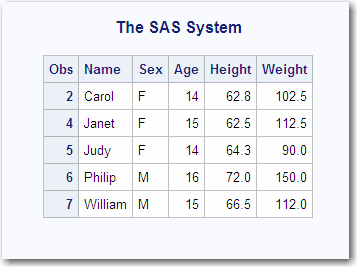STARTOBS= LIBNAME Statement Option
Specifies the starting observation number in a user-defined
range of observations to be processed.
| Default: | the first observation in the data set |
| Restrictions: | use STARTOBS= with input data sets only
cannot be used with OBS= system and data set option or FIRSTOBS= system and data set option |
| Interaction: | ENDOBS= |
| Engine: | SPD Engine only |
Details
By default, the SPD
Engine processes all of the observations in the entire data set unless
you specify a range of observations with the STARTOBS= and ENDOBS=
options. If the ENDOBS= option is used without the STARTOBS= option,
the implied value of STARTOBS= is 1. When both options are used together,
the value of STARTOBS= must be less than the value of ENDOBS=.
In contrast to the default
Base SAS engine option FIRSTOBS=, the STARTOBS= and ENDOBS= SPD Engine
options can be used in the LIBNAME statement.
Note: FIRSTOBS= default Base SAS
engine option is not supported by the SPD Engine. The OBS= system
option and the OBS= data set option cannot be used with STARTOBS=
or ENDOBS= data set or LIBNAME options.
(See SPD Engine
Data Set Options for information about using the STARTOBS= data set option in WHERE
processing.)
Example: Using the WHERE Expression
The following example
prints the five observations that were qualified by the WHERE expression
(age >13 in PROC PRINT). The five observations are out of the six
observations that were processed, starting with the second observation
in the data set:
libname growth spde 'D:\SchoolAge' startobs=2; data growth.teens; input Name $ Sex $ Age Height Weight; datalines; Alfred M 14 69.0 112.5 Carol F 14 62.8 102.5 James M 13 57.3 83.0 Janet F 15 62.5 112.5 Judy F 14 64.3 90.0 Philip M 16 72.0 150.0 William M 15 66.5 112.0 ; proc print data=growth.teens; where age >13; run;
